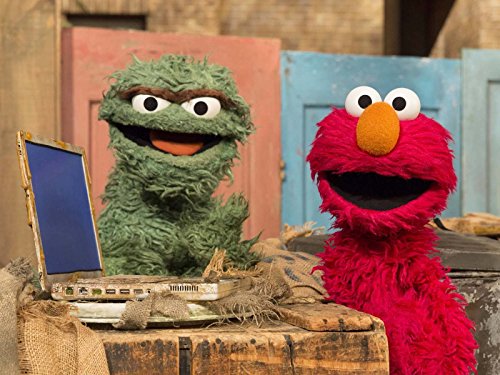In the vibrant neighborhood of Sesame Street, few duos are as paradoxical and strangely harmonious as Elmo and Oscar the Grouch. At first glance, they seem incompatible—Elmo, with his infectious giggles and ceaseless optimism; Oscar, nestled grumpily in his trash can, bristling with sarcasm and deliberate contrariness. Yet their interactions reveal a deeper truth: that friendship isn’t about sameness, but about growth through contrast.
Elmo, the embodiment of sunny innocence, approaches life with endless curiosity and joy. He’s the kind of friend who’ll offer you a hug when you’re least expecting it—and least wanting it, if you’re Oscar. Oscar, by contrast, prefers the comfort of chaos. He revels in garbage, grumbles through greetings, and seems determined to challenge whatever sweetness the world presents. But beneath the crusty surface lies a character with surprising layers—he is deeply loyal, honest to a fault, and often more perceptive than he lets on.
Their dynamic mirrors the kind of friendships we often see in real life: the high-energy child paired with a reflective parent, the bubbly colleague with the pragmatist, or the idealist matched with a skeptic. These relationships thrive not in spite of the differences, but because of them. The cheerful one nudges the other toward levity and possibility, while the grounded one offers wisdom, caution, and a different kind of strength.
Take the example of a father and son relationship where the child jokingly calls himself Elmo and the parent Oscar—a charming inversion of roles that says more than words ever could. In that playful declaration is a deep understanding: the child identifies with exuberance, boundless curiosity, and the power of connection, while the parent anchors the world in thoughtful rhythm, sometimes weary, sometimes wise, always watching with love from the corners of the sandbox.
Friendships like Elmo and Oscar’s remind us that emotional opposites aren’t obstacles—they’re opportunities. Consider workplace duos where creative minds clash with data-driven strategists, or marriages where one partner thrives on spontaneity and the other on structure. When these partnerships are rooted in respect and genuine interest, they become crucibles for transformation. The optimist learns when to pause; the realist discovers when to leap.
Even in storytelling, characters like Sherlock Holmes and Dr. Watson or Woody and Buzz Lightyear echo this dance of polarity. Elmo and Oscar may not be solving crimes or escaping toy stores, but they embody a gentler lesson: how to share space even when you don’t share temperament. How to learn from what irritates you. How to grow without having to agree.
Their scenes often end with Oscar dismissing Elmo with an exasperated grunt—but not before letting a smile slip, or a lesson land. Elmo, unfazed, cheerfully bounces away, having made yet another tiny crack in Oscar’s gruff façade. It’s in those cracks that growth happens—through empathy, persistence, and the gentle power of showing up.
In a world eager to sort people into neat categories—introvert vs. extrovert, optimist vs. cynic—Elmo and Oscar remind us that the most enduring bonds often defy classification. They’re not trying to change each other; they coexist, challenge, support, and surprise.
And maybe that’s what real friendship is: not agreement, but appreciation. Not smoothing out every difference, but dancing with them.










